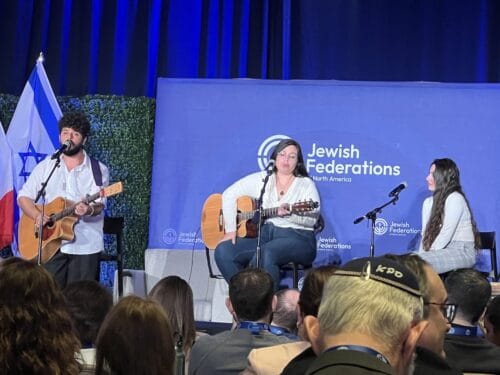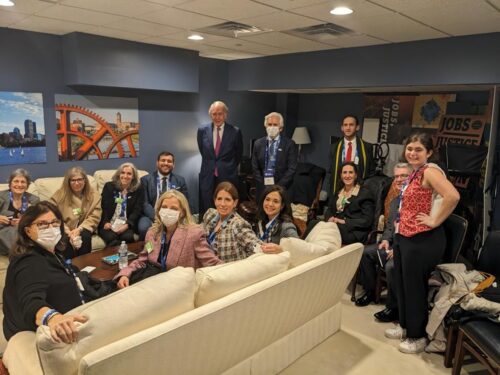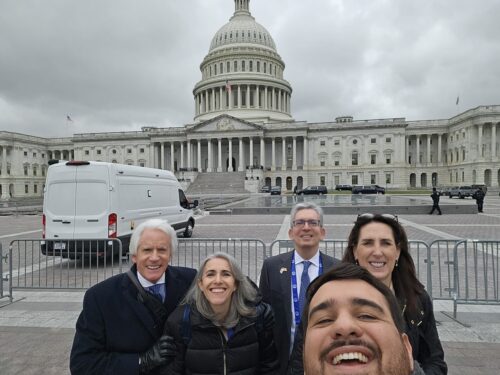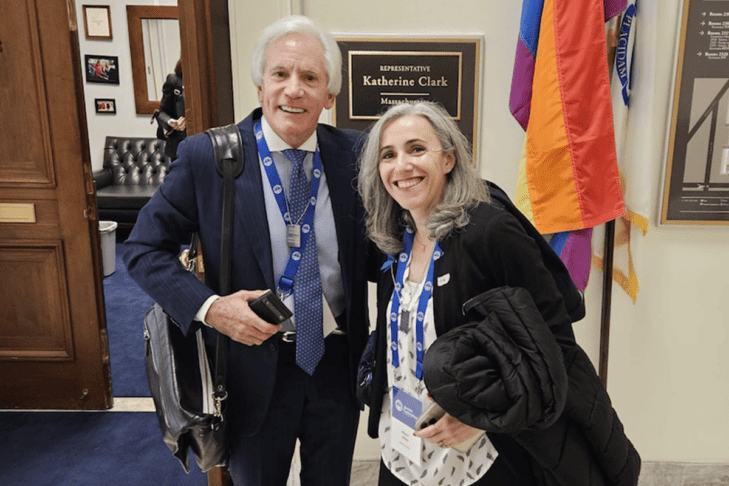Earlier this week, I joined 400 other Jewish community members from across the country (including a dozen from Boston) for advocacy in Washington, D.C. Jewish Federations of North America (JFNA) organized a “fly-in” for delegations from its many member communities to come together, share our stories, and tell our federal legislators more about several key issues for the Jewish community in this moment.
We came prepared to urge ongoing U.S. support for Israel, including the passage of $14.3 billion in aid and the release of all hostages. We asked for increased funding for the Nonprofit Security Grant Program, a critical source of support for security assessments, infrastructure investments, and training for many Jewish (and other faith-based) communal organizations, which is an important part of CJP’s 5-Point Plan to combat Jewish hate. And we pushed for Congress to adopt the International Holocaust Remembrance Alliance’s definition of antisemitism, which, among other factors, clearly identifies anti-Zionism as antisemitic expression.
I’ve been in meetings on the Hill before, yet this experience was different. Yes, I still felt the thrill of meeting with our federal representatives, the flutter of nerves and anticipation right before we walked through each grand set of office doors. Walking across the Capitol complex to get from meetings on the House side to the Senate side of Capitol Hill, I was still awed by the Federal City, its regal buildings telegraphing the concentration of power and decision-making within. Yet, this time the stakes felt higher, the moment more urgent.
At breakfast, preparing for the day ahead, we each affixed small pieces of masking tape with the number “117” to our jackets—a practice started by Rachel Polin Goldberg, the mother of an Israeli hostage, to mark the days of captivity.

The evening before our advocacy visits, we heard musicians from the Gaza Envelope, young performers in their 20s and 30s, using their art to express their pain and share their stories. As we met with members of Massachusetts’ congressional delegation, urging their continued support for Israel, including ongoing efforts to secure the safe release of the remaining 136 hostages, we carried these voices with us.
As we moved through the congressional office buildings, we saw member offices with signs stating their support for Israel. These were moving reminders of the depth of the U.S.-Israel relationship. We passed other delegations doing the same important work, identifiable by their blue ribbons and dog tags calling to “Bring them home – now!” The power of the collective, of Jewish community stretching across the U.S. and Israel, was palpable in every moment.

We traveled to Sen. Ed Markey’s tiny “hideaway” office—space provided to each senator under the Capitol to work between votes—passing through multiple security checks and escorted by Senate staffers. As we spoke with the senator, he reminded us that the narrow hallways we had just traversed were the same ones filled with protestors on Jan. 6, an angry mob banging on doors looking for members of Congress. The comparison to Oct. 7 and families hiding in safe rooms was unmissable, and we had the opportunity to remind a U.S. senator of our shared humanity across oceans.

Many of those who came to D.C. for this fly-in were new to federal advocacy. They were moved by current events to speak up and were quickly coached by more experienced advocates on how to share their voices and connections to the issues at hand. In closing our meeting with Sen. Elizabeth Warren’s team, her senior staffer thanked us for sharing our personal stories, noting how helpful it is for the team to hear real-life impact on the lives and loved ones of her constituents. It was a powerful reminder of why it matters to participate in experiences like this one.
On the collective scale, simply showing up to be counted matters, each of us making the effort to be in D.C. so that policymakers address a crowd 400 strong. And in those smaller settings, in each congressional office, we can provide nuance and resonance that cannot be provided through briefing papers alone. I’m grateful to every member of the Greater Boston community who made the time to be in D.C. this week. We brought our individual voices to a much greater communal chorus, asking for safety, security, and the ability to joyfully engage in Jewish communal life without threat.



